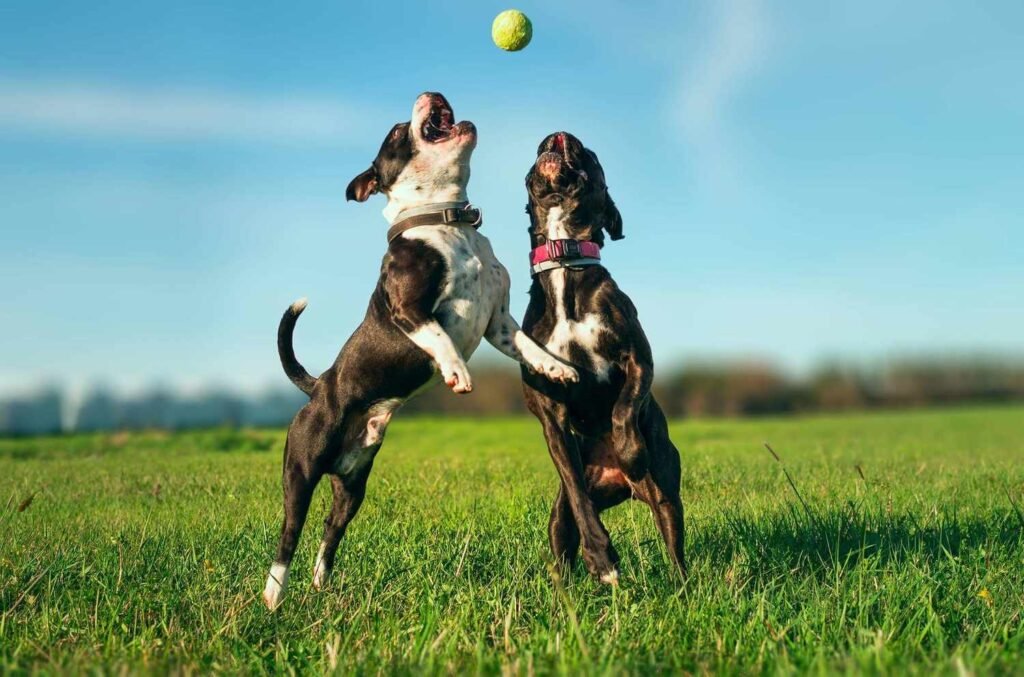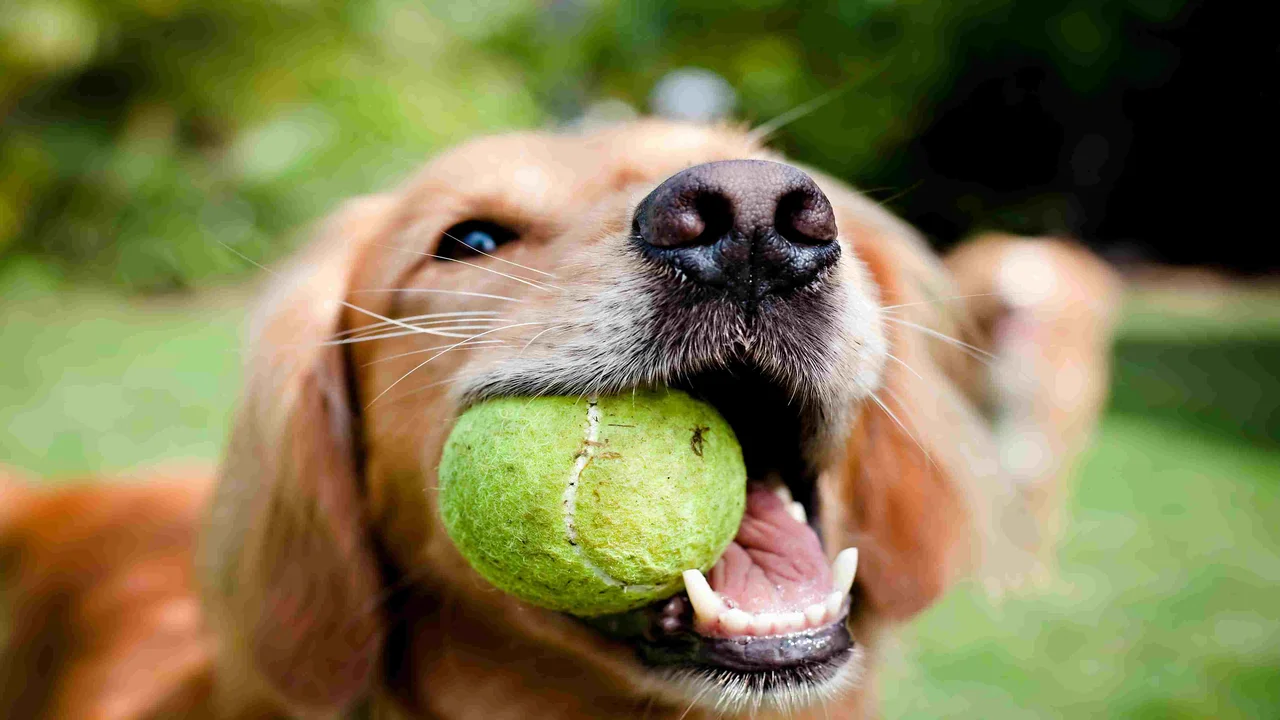Tennis balls are a classic, time-tested toy for dogs that can provide hours of fun and excitement for your pup. A simple game of fetch is great fun for a dog, and it will improve their fitness and build an unbreakable bond of trust and friendship with their owner.
Playing with a tennis ball that can bounce in many directions will excite your dog and help them connect to nature. Dogs like tennis balls as they are the perfect size to be held comfortably in their mouth, and they have a wonderful springy texture that induces them to bite down and enjoy the ball as it springs back up again.
That loyal bond of love and affection that, once established, lasts a lifetime. Spending quality time with one another is the best way to strengthen this beautiful connection. Playing fetch with your dog is an extremely enjoyable experience for them, and seeing them so happy can be enjoyable for you too. Tennis balls bounce erratically, fit perfectly between most jaws and are so much safer than that other dog toy staple, the stick.
Are Kong tennis balls safe for dogs?

Are Kong Tennis Balls safe for dogs or not? When you think of dog toys, tennis balls are one of the first things that spring to mind. They are one of the most timeless and classic sources of canine entertainment available.
But not all tennis balls are equally good for your dog. That makes it natural to ask whether Kong Tennis Balls are safe for dogs while standing in the toy aisle of the pet store. So, are Kong Tennis Balls safe? And what about tennis balls, more generally?
Read More: How to sharpen dog clippers?
The short answer is yes. Kong Tennis Balls are safe for dogs. But that’s not the whole answer. While Kong Tennis Balls are safer than ordinary tennis balls, they aren’t perfect either.
Let’s look further at how the Kong tennis ball cleverly promotes canine safety and some of the risks these balls can pose. Here’s how the Kong Tennis Ball differs from a standard tennis ball:
- Impact On Dental Health
Are Kong Tennis Balls safe for a dog’s teeth? Tennis balls are notorious for damaging your dog’s teeth. That green fuzz so distinctive to tennis balls is the equivalent of sandpaper. And if your dog enjoys pulling the green fuzz off the tennis ball, they can damage the enamel of their teeth.
Tennis balls are especially problematic for dogs predisposed to dental diseases, like:
Dachshunds
Chihuahuas
Cavalier King Charles Spaniels
Pugs
Yorkies - Intestinal Blockages
Assuming your dog successfully separates the feet from the ball, there’s the danger of them swallowing it. That’s not ideal for various reasons.
But the primary problem is that the material on tennis balls is hard to digest. In the best-case scenario, you will find yourself treating canine constipation. Worst-case scenarios involve you calling the vet because of a - Choking Hazards
The other problem with tennis balls is that, as toys go, they aren’t durable. That’s fine for soft-jawed dogs content to play. But many dogs prefer to destroy their tennis balls and chew the pieces.
Non-Abrasive Material
Kong Tennis Balls look ordinary but aren’t made the same way. The yellow-green material on these balls won’t affect your dog’s dental health. It’s also significantly trickier to get off the ball.
Several Sizes
Because tennis balls were designed for tennis players rather than dogs, they have a one-size-fits-all construction. But no evidence suggests Great Danes enjoy tennis balls less than Teacup Poodles.
Durability
The other reason Kong Tennis balls reduce choking in dogs is that they last longer. Even the stubbornest terrier can’t chew through a Kong Tennis Ball as quickly as they can through a standard ball.
Non-Toxic Material
The other point in favour of Kong Tennis Balls is that they are made with non-toxic BPA-free material. That means that even if your dog somehow penetrates and swallows pieces of a tennis ball, the material doesn’t pose the same threats as latex or certain types of plastic.
Can a dog pass a tennis ball?
How long does it take for a dog to pass a ball? If the ball is small enough to pass through, it typically takes around 11 to 24 hours for a dog to pass it successfully. If you notice that the ball consumed is large or has not been passed after 24 hours, it is imperative to seek medical treatment immediately. This type of case is not uncommon, as dogs often swallow balls and other foreign objects. These can often require surgical removal as the ball becomes lodged in the pylorus (the opening between the stomach and small intestine), leading to obstruction.
Once swallowed, it will be too big to pass and can cause an obstruction and other serious medical problems. Did you know that some dogs can swallow tennis balls whole? Once swallowed, it will be too big to pass and can cause an obstruction and other serious medical problems.
How To Clean Tennis Balls For Dogs
Make a mixture of water and white vinegar, and soak toys for about 30 minutes. This method applies to hard and soft toys as well as tennis balls. Scrub any dirt and grime off with a sponge or rag, then sit in the sun to dry, rub with a dry towel, or dry on low heat in the dryer.
Wash them in a bucket of soapy water
Fill a bucket (or the kitchen sink) with warm water, and add either dishwashing soap or laundry detergent. Be sure to use a mild detergent or soap; a little goes a long way! Measure out how much detergent you would use to wash a small load of laundry or dish soap to wash a sink full of dishes.
Wash them in a washing machine
The washing machine works well for tennis balls. Be sure to use a pet-friendly detergent, and use about as much as you would for a small load of laundry. Choose the low spin cycle to get some water out and finish drying in the dryer on a low setting if needed.
Dogs Like Tennis Balls

Dogs love tennis balls for many reasons. Here are some common reasons why dogs like to play with tennis balls.
Tennis balls are easy for dogs to catch: The shape and size of a tennis ball makes it easy for dogs to pick up and catch. This is especially important for small dogs or dogs with dental problems who may have difficulty carrying large toys.
Tennis balls are bouncy: Dogs love toys that move, and tennis balls are bouncy. This makes them ideal for chasing and fetching.
Tennis balls are durable: Tennis balls are made of a tough, rubbery material that is resistant to tearing and tearing. This means they can withstand a lot of chewing and playing without falling out.
Tennis balls are inexpensive: Tennis balls are relatively inexpensive compared to other dog toys, making them an affordable option for dog owners.
Tennis balls can be used for a variety of sports: In addition to fetch, tennis balls are used in other sports such as tug-of-war, catch, and even as a training tool for obedience or agility. can be used.
Overall, tennis balls are a classic and beloved toy for dogs because of their versatility, durability, and affordability. So the next time you see your furry friend playing with a tennis ball, you’ll know why they love it so much!










